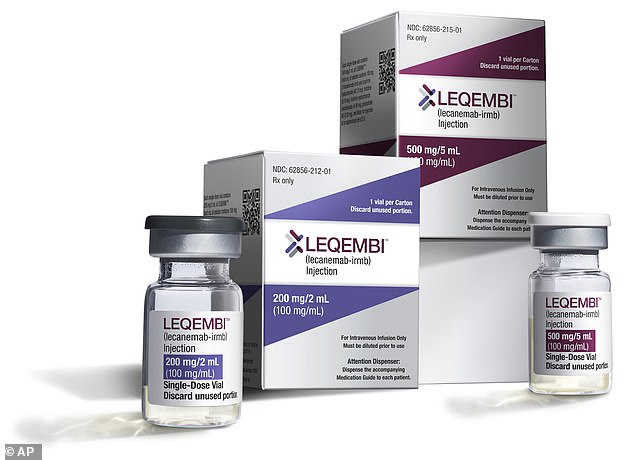‘Miracle cure’ for Alzheimer’s will NOT be offered on the NHS after the medicines regulator ruled the benefits are too small to justify the staggering ‘£1bn a year’ cost of the rollout, but it will be available to private patients who can pay £20,000 a year




Britons at increased risk of Alzheimer’s will no longer have access to an NHS ‘wonder drug’ to treat the incurable disease, health officials announced today.
Lecanemab has been proven to slow the progression of the memory-destroying disease in its early stages.
It was approved today by the medicines authority, the Medicines and Healthcare products Regulatory Agency (MHRA).
But draft guidance from the UK medicines regulator ruled that the benefits of the drug, which is estimated to cost the NHS £1 billion a year, are “too small to justify the cost”.
This means that lecanemab will only be available to Britons who can afford to pay around £20,000 privately each year.
Campaigners and charities today called the decision “bittersweet” and “deeply disappointing”. But experts also pointed to a “lack of evidence” about the long-term effects.

Lecanemab (pictured) has been shown to slow the progression of the memory-destroying disease in its early stages. It was approved today by the medicines regulator, the Medicines and Healthcare products Regulatory Agency (MHRA)

Alzheimer’s disease is the most common cause of dementia. The disease can cause anxiety, confusion and loss of short-term memory.
It is estimated that around 70,000 adults in England would be eligible for treatment with lecanemab if it were approved for use in healthcare.
Research has shown that the drug can slow the progression of the disease by as much as 27 percent by helping to clear the build-up of the harmful protein amyloid in the brains of people with early-stage Alzheimer’s.
These proteins are known as amyloid immunotherapy and are thought to disrupt communication between different parts of the brain, resulting in symptoms that affect memory and independence.
Experts have long believed that this could herald a new era of dementia treatments, by addressing the cause rather than just alleviating symptoms.
The drug has already been given the green light in the US, China, Japan, Hong Kong, South Korea and Israel.
In the US, the treatment costs £20,000 a year.
But last month it was rejected by the European Medicines Agency, the EU’s medicines regulator, over concerns about side effects including “swelling” and “possible bleeding in the brain”.
It is now the first drug approved in the UK shown to slow the progression of the disease by four to six months, the independent committee from the National Institute for Health and Care Excellence (Nice) heard.
Previously, the only drugs available in the UK for Alzheimer’s were aimed at treating the symptoms.
Julian Beach, interim director of quality and access to healthcare at the MHRA, said: ‘We have received assurances that, in addition to the conditions for authorisation, the relevant regulatory standards for this medicine have also been met.
‘As with all medical products, we will closely monitor their safety. In addition, we will conduct a controlled post-approval safety study to ensure that the risk-benefit balance of lecanemab in clinical use is closely monitored.’
Dr Samantha Roberts, NICE Chief Executive, added: ‘This is a new and emerging field of medicine that will undoubtedly develop rapidly.
‘The reality, however, is that the benefits of this initial treatment are too small to justify the significant cost to the NHS.
‘It is an intensive treatment that patients have to undergo, requiring them to go to the hospital every two weeks and requiring skilled staff to monitor patients for signs of serious side effects. In addition, there are costs associated with purchasing the drug.
‘Our independent committee has thoroughly evaluated the available evidence, including the benefits to carers, but NICE should only recommend treatments that are good value for money for the taxpayer.’
But charities and campaigners called NICE’s decision “deeply disappointing” and urged the government to “find a solution” to prevent Britons with dementia being left behind.

It is currently thought that around 900,000 Britons suffer from the memory-robbing disorder. But scientists from University College London estimate that this number will rise to 1.7 million within two decades as people live longer. It is a 40 per cent increase on the previous forecast in 2017.
Hilary Evans-Newton, chief executive of Alzheimer’s Research UK, said: ‘Today’s news is twofold for people affected by Alzheimer’s disease.
‘It is a remarkable achievement that science now delivers recognized treatments that can slow the devastating effects of Alzheimer’s, rather than just relieve symptoms.
‘However, it is clear that our health care system is not yet ready to embrace this new wave of Alzheimer’s drugs.
‘It means that, as things stand, people in the early stages of the disease will no longer be able to access lecanemab through the NHS, and it will only be available to those who can pay for it privately. This is deeply disappointing.’
She added: ‘Of course, like first-generation treatments for other diseases, lecanemab has modest benefits and side effects that require careful monitoring.
‘It’s not a cure, but it’s a real step forward: the first new dementia drug to hit the market in more than 20 years.
‘Further negotiations between NICE, Eisai and the NHS could provide a way out.
But the heartbreaking reality is that those who could benefit from drugs like lecanemab don’t have time to wait.
‘We have written to Health Secretary Wes Streeting urging him to take action and find a solution so that people with dementia in the UK no longer miss out on access to innovative treatments.
‘Lecanemab represents the beginning of a huge change in the way diseases like Alzheimer’s will be treated in the future.
There are currently more than 160 studies worldwide testing over 125 experimental treatments for Alzheimer’s, 30 of which are in advanced stages.
‘Despite today’s frustrating news, the question is mainly when, not if, new treatments will become available.’
In April it was announced that around 5,000 Britons could have a cheap blood test to detect Alzheimer’s, in the hope of drastically reducing the NHS’s ‘shocking’ diagnostic figures.
Researchers from Oxford and University College London will use tests to detect proteins in the blood linked to the disease in two groundbreaking studies.
At the time, researchers said they hoped the “groundbreaking” blood test, which costs around £100, would speed up the process, allowing patients to receive treatment sooner.
The trials, expected to cost around £10 million, will take place across the UK and involve people who have reported symptoms to their GP and who may be in the early stages of dementia.
An NHS England report published earlier this year said that ‘early diagnosis of dementia is vital’, and new blood tests could soon replace lumbar punctures in diagnosing the disease.
In the UK, an estimated 944,000 people have dementia, while in the US the figure is estimated at 7 million.
Alzheimer’s affects about six out of ten people with dementia.
This is thought to be caused by a build-up of amyloid and tau in the brain, which clump together, forming plaques and tangles that make it harder for the brain to function properly.
Eventually, the brain can no longer process this damage and symptoms of dementia develop.
Memory problems, problems with thinking and reasoning, and language problems are common early symptoms of the condition, which worsen over time.
Dementia is expected to increase dramatically in the coming years, and a low-cost screening method is essential to address this challenge.
An analysis by Alzheimer’s Research UK found that 74,261 people will die from dementia in 2022, compared to 69,178 the year before, making it the biggest cause of death in the country.




